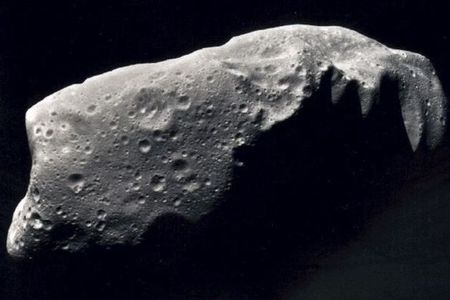Planetary Resources, a company founded by several space entrepreneurs and backed by such high-profile names as James Cameron, Larry Page, and Eric Schmidt, plans to begin prospecting for natural resources like water or precious metals in near-Earth asteroids (NEAs) by 2022. Co-founder Peter Diamandis claims that “everything we hold of value on Earth — metals, minerals, energy, real estate, water — is in near-infinite quantities in space.”
Asteroids are made mostly of rock and metal and range from a couple of dozen feet wide to nearly 10 miles long. The new venture targets the free-flying asteroids, seeking to extract from them the rare Earth platinum metals that are used in batteries, electronics and medical devices, Diamandis said.
Water can be broken down in space to liquid oxygen and liquid hydrogen for rocket fuel. Water is very expensive to get off the ground so the plan is to take it from an asteroid to a spot in space where it can be converted into fuel. From there, it can easily and cheaply be shipped to Earth orbit for refueling commercial satellites or spaceships from NASA and other countries.
In the past couple of years, NASA and other space agencies have shifted their attention from the moon and other planets toward asteroids. Because asteroids don’t have any substantial gravity, targeting them costs less fuel and money than going to the moon, Anderson said in a phone interview.
There are probably 1,500 asteroids that pass near Earth that would be good initial targets. They are at least 160 feet (50 meters) wide, and Anderson figures 10 percent of them have water and other valuable minerals.
“A depot within a decade seems incredible. I hope there will be someone to use it,” said Andrew Cheng at Johns Hopkins University’s Applied Physics Lab, who was the chief scientist for a NASA mission to an asteroid a decade ago. “And I have high hopes that commercial uses of space will become profitable beyond Earth orbit. Maybe the time has come.”
Space experts said such a bold project has huge startup costs. Diamandis and Anderson would not disclose how much the project will cost overall. Diamandis said by building and launching quickly, the company will operate much cheaper than NASA.
But still the costs are just too high, said Purdue University planetary geologist Jay Melosh, who called space exploration “a sport that only wealthy nations, and those wishing to demonstrate their technical prowess, can afford to indulge.”
Anderson, who co-founded the space tourism business, said he’s used to skeptics.
“Before we started launching people into space as private citizens, people thought that was a pie-in-the-sky idea,” Anderson said. “We’re in this for decades. But it’s not a charity. And we’ll make money from the beginning.”
AP/Canadajournal
 Canada Journal – News of the World Articles and videos to bring you the biggest Canadian news stories from across the country every day
Canada Journal – News of the World Articles and videos to bring you the biggest Canadian news stories from across the country every day



